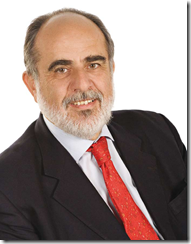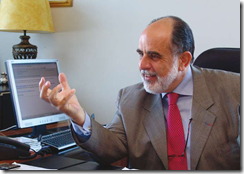Vincenzo Nesci is a 30-year veteran of Alcatel and Alcatel-Lucent, and at the beginning of this year became the non-executive president of Alcatel-Lucent’s operations in the MEA , giving way to Amr El Leithy to assume the executive leadership of the business. In an exclusive and informal interview with Comm., Nesci reminisces about the almost four decades he has spent in the region, and about the Alcatel-Lucent that exists today
Nesci joined Alcatel in 1980 and held several positions in Italy, East Africa and Belgium before becoming Alcatel vice president for the Middle East
At the age of 61, Vincenzo Nesci believes this is as good a time as any to offer younger people the opportunity to shine in the corporate limelight. Thus his departure from Alcatel-Lucent as the company’s president for the Middle East and Africa region fills him with a greater sense of pride and satisfaction than with any sense of loss for the passing of his time.
“I am proud of my contribution to the activities in the region,” Nesci comments. “I believe that El Leithy is inheriting a strong and relevant company in the region and that is deeply satisfying to me.”
For a man who first started working in the ICT sector in Africa in 1972, Nesci has a unique insight as to just how dramatically communications technology, in particular mobile communications, has helped alter the landscape of economies across the MEA .
“I remember when I first arrived in Nigeria all those years ago for the first time, there was no fixed-line phone in my office,” Nesci recalls. “Messages had to be sent physically around the office, or from one location to another, which is a world away from what modern communication networks offer.”
Nesci lived in Egypt for 21 years and remembers that at the time of his arrival there were just 500,000 fixed lines, with only half of them in working order. Today, Egypt boasts 11 million fixed-lines and 43 million mobile lines, and the impact of this technological advancement has been felt throughout people’s social and business interactions. While many companies and individuals operational in the developing world view their role as being to enlighten and educate local counterparts, Nesci says he has looked to exchange knowledge with all of his customers during his working career, imparting knowledge while at the same time receiving it.
“It has been one of my greatest sources of satisfaction to learn from Etisalat,” Nesci states categorically. “This was a true partnership where Alcatel-Lucent and Etisalat worked at solving problems together,” he adds.
The development of local talent is another area in which Nesci has the fondest memories, having been active in the development of local capabilities in-country in many of the markets he oversaw as a senior executive with Alcatel-Lucent. He also enjoyed the opportunity to work in culturally sensitive countries in the region, which may not have the most positive international reputation, but in which inhabitants remained hungry for information and communication just as in any other part of the world.
The fact that Amr El Leithy, Alcatel-Lucent’s incoming MEA president has experience of the Internet/IT market fills Nesci with confidence that he will do well for the company
“I feel a deep sense of satisfaction to have brought communications to these countries and help democratise places, not in a political sense but in a social one,” Nesci says.
For the main part, Nesci applauds the roles that governments have played across the MEA in helping to foster and expand the telecom sector in their respective markets, believing that those countries that were early in establishing independent regulatory authorities are the ones to have benefited the most.
An area that has hampered progress to some degree is the operation of bloated state-owned telecom incumbents, which Nesci describes as having been more like employment agencies rather than commercially run operators. As privatisation and liberalisation of the telecom sector has occurred in much of the MEA region in the past decade, this is proving to be less of an inhibitor as all operators are forced to adapt or struggle. Alcatel-Lucent has itself
gone through some turbulent times, not least in the period leading up to the merger between Alcatel and Lucent in 2006. Both companies were finding the going tough as independent companies, though very real concerns were raised with regards to whether the disparate corporate cultures of the two organisations could in fact be bridged in order to create a viable single entity.
“I do admit that at the beginning of the Alcatel/Lucent merger, each party came to the table with baggage,” Nesci says frankly. “However, over a relatively short period of time it became clear that we needed to be more focussed on external fights than on any internal rivalries, and at this point our integration of corporate culture is complete.”
Following a string of poor quarterly results in the latter part of 2008 and early part of 2009, market speculation mounted that Alcatel-Lucent would be the next telecom vendor to succumb to the tightened global economy; a situation that Nesci describes as the ‘Nortel syndrome’, which competitors exploited as much as possible. The company still faces its challenges in a highly competitive environment, but under the leadership of well-regarded telecom executive Ben Verwaayen, who was appointed Alcatel-Lucent CEO in September 2008, the vendor is on arguably the most solid footing since its creation in 2006.
With respect to his personal situation, Nesci says he is looking forward to the next 10 years, in which his focus is likely to shift in the direction of playing more golf while as raising his involvement in humanitarian activities. Corporate social responsibility has been a large part of Nesci’s agenda as a senior manager at Alcatel-Lucent, and he feels obliged to continue such efforts on a personal level.
“I want to give back. This region has offered me so much, I feel I have to. But I also intend to continue to be productive, and shall be involving myself with activities in region,” Nesci concludes.







0 comments ↓
There are no comments yet...Kick things off by filling out the form below.
Leave a Comment